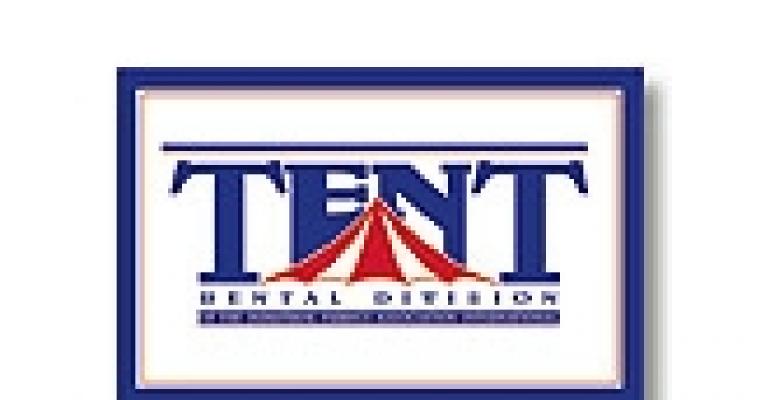
THE ARKANSAS TENT tragedy in October — in which three employees of a party rental company died after allowing a tent they were carrying to touch power lines — has focused the attention of the industry on worker safety. In this month's “Rental Essentials,” we look at resources available to event rental operators to train their crews in best tent-handling practices.
The good news is that crew deaths related to tent installation are actually “very rare,” says Phil Kelling, president of Kansas City, Mo.-based American Rental Association Insurance Services. A proper site inspection might have prevented the Arkansas tragedy, so “the more you emphasize a site survey, the better,” Kelling adds.
Site surveys and other safety procedures are part of the tenting component offered in the Certified Event Rental Professional program developed by the Moline, Ill.-based ARA.
THE RIGHT WAY
The CERP program, designed for both employees and management, requires participants to complete coursework in three of eight disciplines, one of which is tenting. The tenting component covers the development of the tent rental industry including types of tents and accessories; the tent rental process from planning the installation to preparing the products; and tent setup and take-down. The course “makes a point of saying there is a right way and a wrong way to install tents, although it does not list all of the possible hazards,” notes Kathy Schwartz, ARA senior vice president of operations.

CERP is a self-paced study program, which most students complete within one year. The program including registration, courses, final assessment and certification is $475. For more information or to down- load a registration form, visit the ARA Web site at www.ararental.org.
Another trade association — the Industrial Fabrics Association International, based in Roseville, Minn. — offers its “Procedural Handbook for the Safe Installation and Maintenance of Tentage.” The product of 10 years of work by the Education Committee of the IFAI's Tent Rental Division, the handbook “is designed to educate the novice as well as experienced tent renters on installation theory, with an emphasis on safety,” notes Jan Schieffer, the division's manager. “The ultimate goal is to elevate quality and safety standards in the industry as a whole.”
Topics covered are site surveys, layouts, staking and anchoring, poles, sidewalls, tensioning a tent, and safety and maintenance. The 2004 edition, available on CD-ROM only, is $20 for members of the IFAI Tent Rental Division, $100 for IFAI members and $385 for all others. For more information, visit http://bookstore.ifai.com.
Another source for tent installation information is the IFAI Tent Expo in Orlando, Fla., Jan. 26-29. The tent exposition will offer 100,000 square feet of tent and fabric structure displays along with seminars focused on education and training for employees of the tent rental business. To learn more, visit www.tentexperts.org.
COMPANY WITH CLASS
Besides the training available from industry associations, several tent manufacturers offer seminars for their tent customers.
For example, Simpsonville, S.C.-based TopTec will conduct its ninth annual tent training session this month at company headquarters. The three-day program, limited to 40 students, costs $50 and covers topics including site surveys, layout, staking, tent repairs, and cleaning and installation of pole and frame tents. Although the sessions are advertised to the company's customers, “we have companies come who have never used our products before, and they end up as customers,” notes Carolyn Wynn, TopTec secretary/treasurer.
Despite the resources available to train their crews in safe tent-handling, many in the event rental industry haven't wised up to the importance of education, some observers say.
PAY THE PRICE
Some rental companies invest so much in their tent inventory that they cut corners on training, says Eddie Redman, a veteran rental operator who oversaw materials handling for the 2002 Winter Olympics and who now consults with Grand Event Rentals of Bellevue, Wash. “Companies can make large dollar revenues by offering tents, but tents are expensive to buy, and it takes a long time and experience to make money,” he says. “But [operators] are blinded by the dollar signs, and so everybody jumps into tents. Guys who are after the almighty buck will cut corners.”
Another hurdle is the self-image of the tent crews themselves, according to Thomas Gifford, founder of Sonoma, Calif.-based furnishings supplier ThomasG and longtime party rental executive.
“There is a pervasive macho attitude in party rental,” Gifford says. “To be in this type of work, you are the type of personality that can work long hours, pull through in a pinch, stand out in the wind and rain, and make it happen. These are rough-and-tumble guys who — unlike people in the construction industry who use safety equipment and wear hard hats — don't see themselves as professionals, and neither does the client. If I tried to charge a catering client $800 to have tent crews on standby just in case something happened, the caterer wouldn't pay for it.”
But unless tent crews begin to view themselves as trained professionals, accidents will continue to harm workers and drive up insurance premiums, Gifford maintains. “Given the situation with insurance costs, we have to continue to raise prices or we have to improve safety,” he says. “ARA and IFAI have made tremendous efforts to get the education out. Are the rental operations going to step up and behave accordingly?”
RESOURCES
American Rental Association, 800/334-2177, 309/764-2475; ARA Insurance Services, 800/821-6580; Industrial Fabrics Association International, 800/225-4324, 651/222-2508; Eddie Redman, 206/331-0186;0 ThomasG, 818/846-1324; TopTec, 800/845-2830, 864/967-4312





